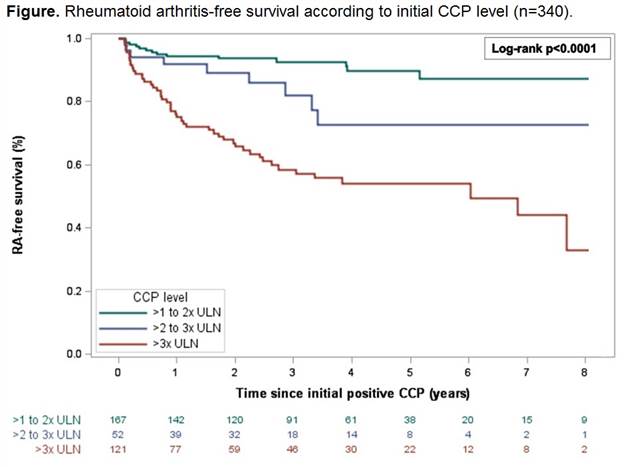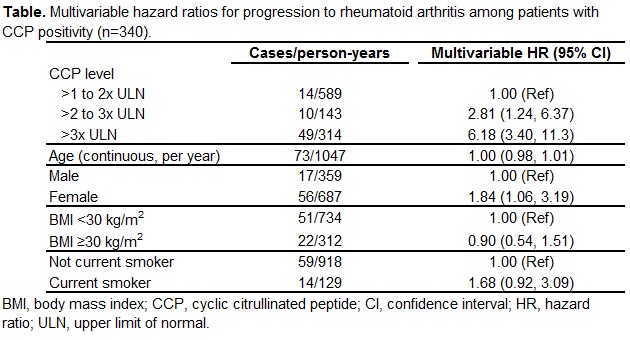Session Information
Date: Monday, October 22, 2018
Session Type: ACR Concurrent Abstract Session
Session Time: 4:30PM-6:00PM
Background/Purpose: Autoantibodies to cyclic citrullinated peptide (CCP) are present years prior to the onset of clinical RA. This observation was based on blood bank samples from individuals who later developed RA as well as prospective research studies in European arthralgia clinics. To expand the understanding of the association and timing of future RA in CCP+ individuals, we investigated the risk of progression to RA in a US hospital-based cohort of patients who were CCP+ without RA at presentation.
Methods: We performed a retrospective cohort study of CCP+ individuals seen at a US tertiary care system between 2003-2016 who were without classifiable rheumatic disease including RA per 2010 ACR/EULAR criteria by medical record review within one month of initial positive CCP. Incident RA by ACR/EULAR criteria and date of diagnosis were identified and confirmed independently by two rheumatologists through medical record review. We investigated the risk of progression to RA overall and stratified by CCP level (low: >1 to 2 times upper limit of normal [x ULN]; medium: >2 to 3x ULN; high: >3x ULN). We used multivariable Cox regression to evaluate the effect of CCP level on RA risk.
Results: We identified 340 CCP+ patients who at baseline were without RA or other rheumatic disease; 66% of the patients were female, and mean age was 55.0 years (SD 15.3). The most common indication for checking initial CCP was arthralgia (74%) followed by lung disease (10%). There were 73 (22%) patients who developed incident RA during 1047 person-years of follow-up. Absolute risk of progression to RA increased with higher CCP level (Figure), with 50% of patients progressing to RA by 5 years of follow-up. Compared to low CCP, medium (HR 2.73, 95% CI 1.21, 6.16) and high (HR 6.21, 95% CI 3.42, 11.3) CCP levels were strongly associated with progression to RA (Table). Women had increased risk of progression to RA (HR 1.75, 95% CI 1.01, 3.01) independent of CCP level, age, smoking, and BMI. Checking initial CCP for arthralgia was strongly predictive of progression to RA (HR 6.08, 95% CI 1.91, 19.3) compared to other indications.
Conclusion: In this study of CCP+ patients without RA identified through a US tertiary care system, RA risk increased substantially with increasing CCP level. This study provides support for close monitoring for development of RA among patients with CCP+ as well as the need for identifying strategies to mitigate this risk.
To cite this abstract in AMA style:
Ford J, Liu X, Marshall A, Zaccardelli A, Prado M, Wiyarand C, Lu B, Karlson E, Schur P, Deane KD, Sparks JA. Impact of Cyclic Citrullinated Peptide Autoantibody Level on Progression to Rheumatoid Arthritis Among CCP-Positive Patients without RA in a Clinical Setting [abstract]. Arthritis Rheumatol. 2018; 70 (suppl 9). https://acrabstracts.org/abstract/impact-of-cyclic-citrullinated-peptide-autoantibody-level-on-progression-to-rheumatoid-arthritis-among-ccp-positive-patients-without-ra-in-a-clinical-setting/. Accessed .« Back to 2018 ACR/ARHP Annual Meeting
ACR Meeting Abstracts - https://acrabstracts.org/abstract/impact-of-cyclic-citrullinated-peptide-autoantibody-level-on-progression-to-rheumatoid-arthritis-among-ccp-positive-patients-without-ra-in-a-clinical-setting/


